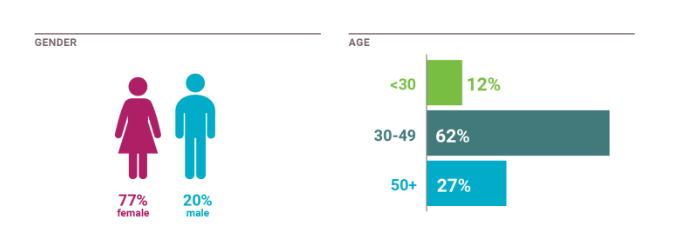Why This Matters
Chicago Public Schools (CPS) is at a crossroad. Seven out of 10 Chicago teachers report that their students are further behind today than before the pandemic. Over the last several years, teachers have been collateral damage in the chaos created by the mayor and CTU’s battles around COVID protocols and whether to keep physical school doors open. And, new leadership is in place or coming at every level of the system: district, union, and school board.
In order to better understand how our frontline workers are feeling at this moment, Educators for Excellence conducted a survey of Chicago Public School teachers.
As Chicago undergoes these many levels of leadership change, this report provides a blueprint for all Windy City leaders to understand the perspectives of Chicago teachers at this critical moment for the students in Chicago Public Schools.
We want to thank our incredible group of Chicago teachers who shaped this survey. Their insights into their classrooms were essential to ensure this report accurately represents the voices and experiences of teachers during this unparalleled time.
The Voices from the Classroom 2022 survey questionnaire was developed by 15 Educators for Excellence teacher members from across the United States. The instrument was written and administered by Gotham Research Group, an independent research firm, and conducted online from January 11 through February 14, 2022, among a sample of 110 full-time public school teachers in Chicago. Note that all survey results are presented as percentages and, due to rounding, may not always add up to 100 percent.

Major Trends and Findings
-
Counter to the national narrative that teachers are planning to resign en masse, Voices from the Classroom - Chicago shows that most teachers remain committed to staying in the classroom long-term: 83% of Chicago teachers report they are likely to stay for their entire career, in line with the 86% of teachers who reported this nationally.
-
Chicago teachers are struggling with the same staffing shortages prevalent across the country. Eighty-three percent of teachers say that shortages of special needs support staff is a problem in their school and 74% say that shortages of social-emotional support staff is a challenge. In addition to these gaps, 62% of teachers report being asked to use their preparation period to cover a class at least once a week.
-
Increasing starting salaries has long been noted as a clear way to increase teacher recruitment and retention; data from Voices from the Classroom - Chicago confirms this to an extent. Fifty two percent of Chicago teachers identified higher salaries as an effective method of retaining teachers. Additionally, teachers in Chicago were much more likely to indicate housing support was an effective financial lever for recruiting and retaining teachers, with 52% selecting this as a top choice, compared to 32% of the national sample. Housing support is particularly important in Chicago because of the residency requirement that Chicago teachers live in the city.
-
From the CDC, to President Biden, to the surgeon general, the nation is in agreement that the pandemic has had an impact on the mental health of young people. Teachers in Chicago agree and are seeing increased needs both academically and social-emotionally: 73% report that the mental health of their students is worse than before the pandemic, 47% say there is increased violence in their schools, and 55% say their schools are not often meeting the needs of students performing below grade-level.
-
And even after years of investment in new materials, teachers tell us that their curricula still don’t include high-quality formative assessments (only 28% yes), aren't high-quality and well-aligned to learning standards (only 42% yes), and aren’t accessible and engaging to learners (only 45% yes). As a result, 93% of teachers spend their time creating their own materials, leading to more burnt-out teachers and less rigorous lessons.
-
Students have fallen significantly behind where they were academically prior to the pandemic, and gaps that already existed along lines of race and socio-economic status have widened. As a result, assessments are even more critical than usual in order to understand the full impact of the pandemic on student learning and direct resources where they’re most needed. Chicago teachers in general viewed assessments positively. They agree that their assessments accurately measure student mastery of state content standards (59%) and that they are clear on the purpose of the assessments they are required to give (70%).
-
A debate over whether schools should be a place to talk about controversial issues, especially about our nation's historical and current racial injustices, has captured the entire nation’s attention. Chicago teachers overwhelmingly agree that school is the place for these conversations. They think the issues of race, racism, and the history of underrepresented populations should be taught in the classroom.
-
The history and experience of black Americans (98% yes)
-
Racial inequality in America’s past (94% yes)
-
Systematic racism in America’s institution and society (89% yes)
-
History and experiences of LGBTQ+ people (89%)
-
-
Teachers in Chicago are not feeling as though their voices are being heard by leadership. 62% of CPS teachers believe that their current union leadership advocates for policies that are in the best interest of their students. However, only half believe that outgoing union leader Jesse Sharkey was an effective leader during the pandemic, and only half see their union as supporting and mentoring new teachers, providing teachers with high-quality training and professional support, supporting the career ladder, or negotiating new ways to meaningfully and effectively evaluate teachers. Additionally, only 11% report being consulted on the use of federal relief funding.
-
Moving forward, teachers advocate for improving mental health support for students (45%), increasing resources for high-needs students (41%), and investing in strategies to support student learning recovery after the pandemic (35%).
National 2022 Teacher Survey
Voices from the Classroom 2022: A Survey of America’s Educators
